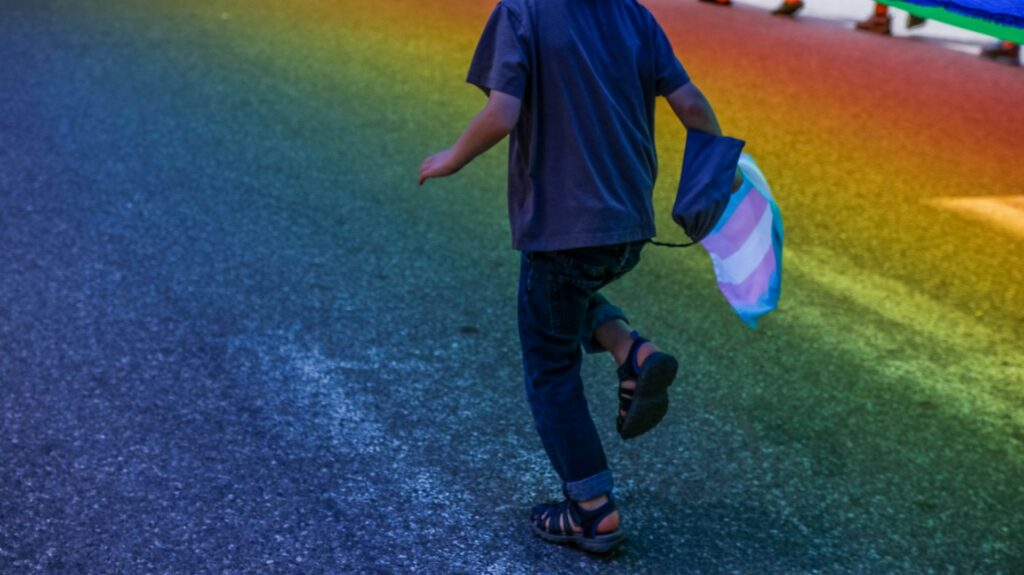More than four in ten trans youth do not feel confident in sport, data shows
Sport is failing trans youth. Transgender young people are four times as likely to not feel confident when participating in sport compared to cisgender boys and twice as likely as cisgender girls.
Four in ten (42%) of trans 7–16-year-olds disagreed with the statement ‘I feel confident when I exercise and play sports’ in 2023, according to Sport England data.
This compares starkly to a fifth (20%) of cis girls and only 9% of cis boys disagreeing with the statement.
Similarly, a concerning one in four trans youth disagreed that they enjoy exercising or playing sport.
That is nearly three and five times higher than the one in ten girls and one in 20 boys, respectively, who also disagreed.
Such attitudes are reflected in sport participation levels too.
Trans youth participation in sporting activities fell by nearly a fifth between school years 3-4 and 9-11, compared to a drop by 15% in cis girls and 4% in cis boys across the 22-23 academic year.
To stay healthy the NHS recommends that children and young people aim for 60 minutes of moderate or physical activity across the week. As such, the wellbeing of trans youth is seriously at stake.
So, why are trans and cis youth sporting attitudes and participation levels so different?
The highly gendered nature of sport and its intense focus on the body and physicality is largely to blame, argues Dr Hel Spandler (they/she), editor of the Non-Binary Inclusion in Sport booklet.
Consequently, sport is an extremely challenging environment for trans and non-binary people who may feel self-conscious about their bodies due to gender dysphoria.
“Trans and non-binary folk are more likely to be affected by unsafe changing facilities and sporting attire that heightens their gender dysphoria,” said Dr Spandler.
“Many gender non-conforming people get bullied at school and this often occurs in sporting environments, by peers as well as teachers.”
Cricketer Amelia Short (she/they), who recently shared her story as a trans woman on Sky Sports News, echoes this as she reflects on her own personal experiences of sport at secondary school.
“The girls played netball, badminton and trampolining and the boys played football, rugby, basketball and cricket,” the 19-year-old said.
“That lays the blueprints for someone who’s not comfortable in their own body to feel left out.
“It is very demotivating. It puts [trans youth] off sport completely because you’re brought up knowing some sports might suit you but are gatekept from you because of your birth gender.”

With sports only available to certain genders, Short has witnessed firsthand students being denied the choice of P.E. lesson despite reasonable justification.
“There was one person transitioning and the school were not accommodating. They could have changed her PE class or let her pick certain sports that she preferred, but sometimes she didn’t get the choice,” said Short.
Gendered changing rooms and toilets in sport have also proved to be a source of great discomfort for the cricketer.
“The changing room culture at school led to a division between the lads,” she said.
“I didn’t want to be in there, I didn’t feel comfortable at all, but I sucked it up and got out there as soon as I could.
“You don’t want to raise attention to yourself because if you don’t get changed in the changing rooms then you receive a whole load of questions.”
However, it is a myth that only trans and non-binary folk are negatively affected by gender binaries and norms in sport, Dr Spandler explains.
“Many men, especially gay men, often find sports participation difficult because sporting environments enforce ‘toxic masculinity’. For example, there are still no high profile out gay male tennis players,” they said.
“Hyper masculine environments can affect girls too, who often feel that playing sport isn’t appropriately ‘feminine’ and worry about their safety and whether they might lose popularity with their peers if they play sport.”
Short’s school experience is a further testament to the enduring impact on cisgender youth.
“Rugby was very physical and especially for someone who was quite skinny, they were an easy target. It didn’t matter who you were, they wanted to see someone cry at the end of the day,” they said.
The data supports this too, showing that cis girls are twice as likely to not feel confident or enjoyment when exercising or playing sport as cis boys.
Policy measures that make participation safer and accessible for trans youth, then, are highly likely to improve sporting attitudes and participation for all.
For example, Dr Spandler recommends organising sports activities based on interests, body types, physiques, height, or weight, rather on the male/female gender binary and sporting gender stereotypes.
“It will make it accessible to other people with different body shapes, sizes, and abilities too, such as people with less ‘obvious’ sporting physiques, disabled youth, fat or thin youth etcetera,” says Dr Spandler.
“We also need to ensure that there are suitably safe gender neutral changing and toilet facilities made available for everyone.”
So, addressing the issues facing trans youth will go a long way in ensuring no one, including trans and cis youth, is failed by sport.
“At the end of the day, people are there to play the game. They’re not there to be abused. They just want to have fun and be considered as a person,” says Short.